2017 was the year of the homophobic purge
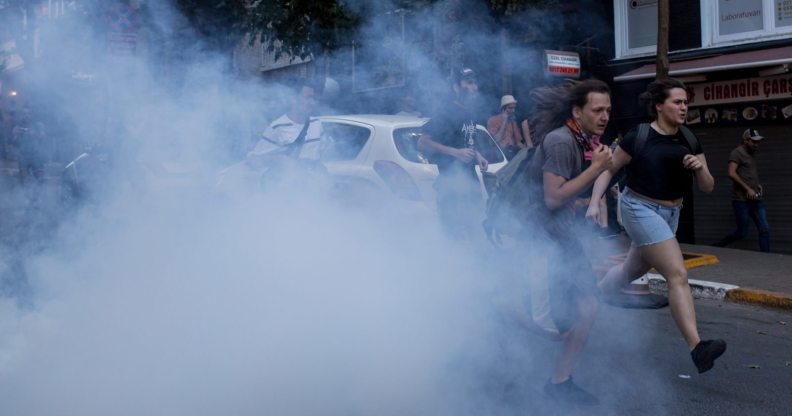
LGBT activists run from tear gas fired by police after attempting to march to Taksim Square on June 25, 2017 in Istanbul, Turkey (Photo by Chris McGrath/Getty Images)
As the situation for LGBT people continues to improve in the West, a more concerning picture is emerging globally.
While 2017 has been a breakthrough year for gay people in Germany, Austria, Malta and Australia, it has also been a year characterised by brutal crackdowns across the world.
Chechnya
Human rights monitors warned earlier this year that authorities in Chechnya, an autonomous region within Russia, had orchestrated a violent ‘purge’ of the gay community.
In response to the warnings, the Head of the Chechen Republic Ramzan Kadyrov insisted that homosexuals are “not people” and should be eradicated to “purify” the blood of the region.
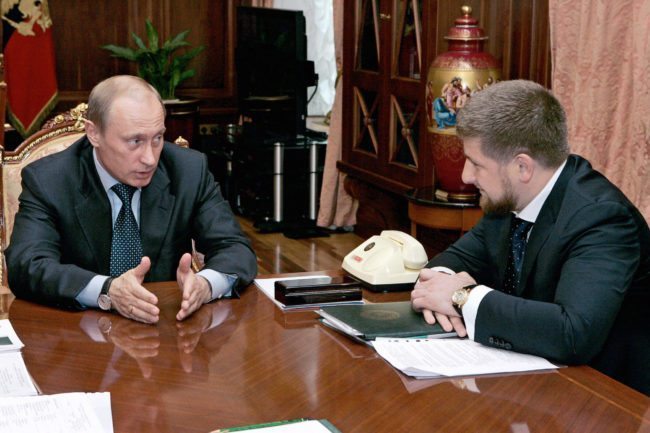
Russian President Vladimir Putin with Chechen leader Ramzan Kadyrov (Getty)
Initial reports of gay men being detained in the region, which is an autonomous region of Russia, were revealed by the newspaper Novaya Gazeta earlier this year.
Journalists who exposed the purge have been forced into hiding as they have received numerous threats from the largest mosque in the region, which has declared jihad against the newspaper.
Following the initial exposure, it was revealed that authorities were forcing gay men into camps, sparking an outcry from LGBT and human rights activists across the world.
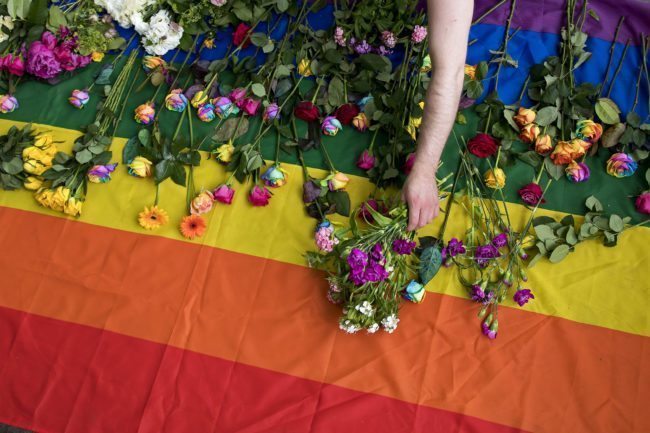
Demonstrators outside the Russian embassy (Getty Images)
A number of heartbreaking stories from the region have been shared, including stories of parents of gay people who were issued a warning to kill their children before police killed them in torture camps.
Tanya Lokshina, from the Human Rights Watch, said that Chechen authorities had been conducting “extrajudicial executions, enforced disappearances, torture and cruel and degrading treatment” over the span of the last two decades.
Novaya Gazeta later confirmed the names of 27 men who were killed on one night in the region.
Egypt
2017 has seen been a dramatic surge in arrests of gay people in Egypt this year, fuelled in part by the country’s media.
Sources on the ground have repeatedly raised the alarm about Egypt’s so-called ‘Public Morality Investigation Unit’, which actively targets the gay community with raids and entrapment.
The situation worsened in September, when the waving of a rainbow flag at a music concert was extensively derided in the press – leading to a dramatic crackdown.
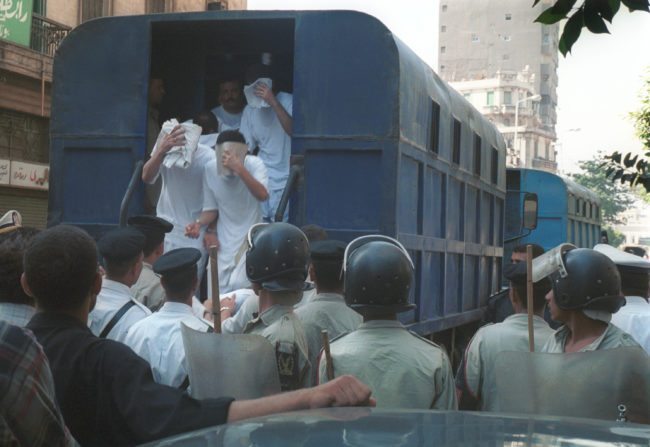
Gay men are put on trial in Egypt (File photo – Getty)
Since the concert, Egyptian authorities began a ‘purge’ targeted at the country’s gay community, raiding homes and arresting more than 60 people.
The state has also banned all mention of LGBT rights or homosexuality in the local media, stifling reporting on the issue.
A report released by the Egyptian Initiative for Personal Rights charted the horrific extent of the issue.
It says: “The EIPR has observed an exponential increase in the number of individuals arrested because of their private sexual practices and/or sexual orientation.
“In what is now known as the as the Public Morality Investigation Unit’s campaign against LGBTQ individuals and men who have sex with men or those perceived as such.”
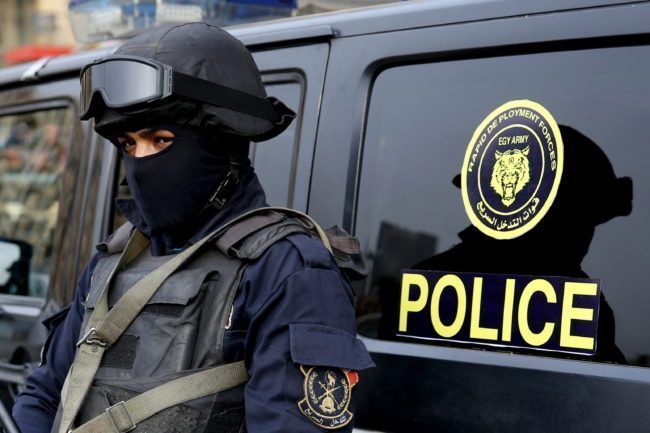
(Photo by STRINGER/AFP/Getty Images)
Data available up until March 2017 shows that arrests have drastically risen in the past few years.
EIPR estimates based on media monitoring that 232 people were arrested between the end of 2013 and March 2017.
Indonesia
Police have clamped down on the gay community in Indonesia this year, with more than a hundred arrested in raids on gay venues and establishments in Jakarta in October.
It is technically legal to be gay in Indonesia apart from in the ultra-conservative Aceh province, which implements harsh punishments under Islamic law.
Amnesty International earlier this year urged Indonesia to stop the caning and arrests of LGBT people in Aceh.
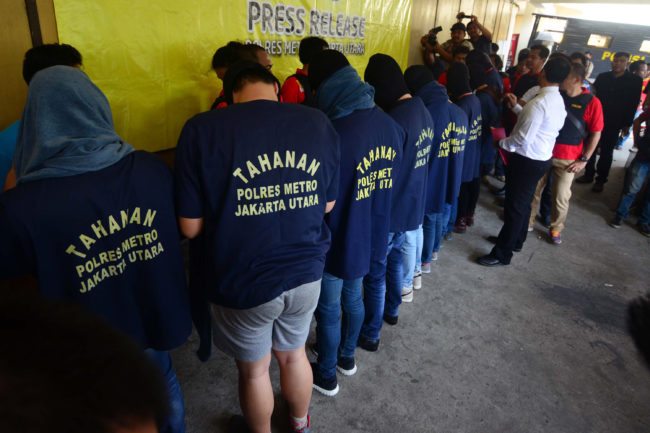
Men arrested in a recent raid stand in line during a press conference at a police station in Jakarta on May 22, 2017. Indonesian police have detained 141 men who were allegedly holding a gay party at a sauna (Photo by FERNANDO/AFP/Getty Images)
Several public floggings have taken place this year, with two men given 83 lashes each for ‘homosexual conduct’.
A report earlier this year alleged that there had been attempts to ‘cover up’ the anti-LGBT oppression in the region by moving the floggings away from the public eye.
Human Rights Watch said that the floggings continue, but that authorities in the Aceh Province have moved them away from being public.
Meanwhile, Indonesian lawmakers have drawn up a bill that would outlaw ‘LGBT behaviours’ on television.
The bill includes Orwellian language that seeks to ban LGBT characters in TV shows, outlawing programs containing “LGBT behaviour.”
The law would require the ‘screening’ of all TV shows, films and adverts by an external censorship body prior to broadcast in order to ensure compliance with the new rules.
Tanzania
In October Tanzanian police have arrested 12 in Dar es Salaam for “promoting homosexuality” as part of an ongoing crackdown.
The group included several lawyers and a charity exec, who had been meeting at a hotel to discuss LGBT rights.
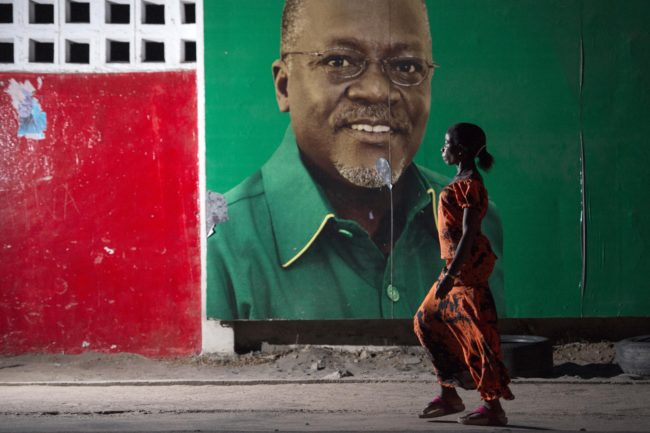
(Getty)
An NGO, the Community Health Education Services & Advocacy (CHESA) group, had beenhold a workshop for the gay community.
The government claimed the group was engaged in “the promotion of marriage between people of the same sex”, but CHESA says its was actually meeting to discuss a legal challenge to the government’s decision to restrict HIV services in the country.
The government later announced it would be suspending CHESA’s operation entirely, effectively blocking any challenge.
An official confirmed that it had “suspended the business of the organisation Community Health Education Services and Advocacy (CHESA) in order to enable the conduct of the investigation into allegations involving the organisation in the promotion of marriages between persons of the same sex”.
A lesbian couple were also arrested earlier this month after a video of a commitment ceremony went viral on social media.
The video of the women exchanging rings and kissing was shared thousands of times online in the East African nation, where homosexuality is a punishable offence.
Tanzania’s law states that being gay is “against the order of nature” and anyone convicted could face life in prison.
Tajikistan
Officials in Tajikistan have reportedly created a list of homosexual people in a move which has been called ‘Operation Purge’.
Zakonnost, a newspaper published by Tajikistan’s state prosecutor, said it had drawn up a register of 367 gay and lesbian people, who they have intimated will be forced to undergo testing to avoid “the spread of sexually-transmitted diseases”.
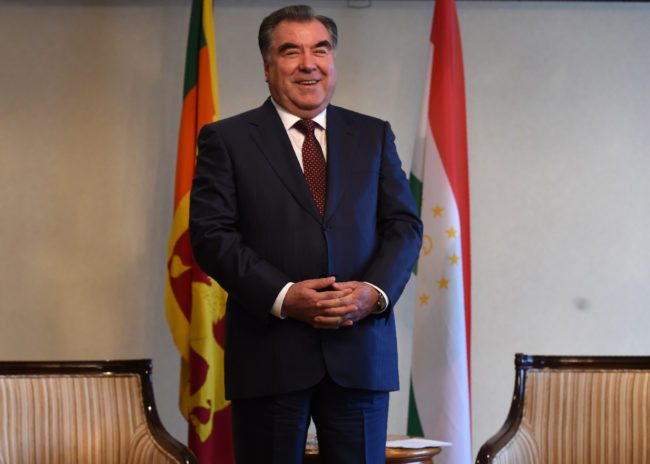
President of Tajikistan Emomali Rahmon (Getty)
The list includes 319 gay men, 48 lesbians and zero trans people, out of the 8.7 million people who live in the country.
Two operations were reportedly carried out last year to unearth the names of LGBT people.
They were called “Purge” and “Morality”.
The central Asian country removed the prohibition on gay sex in 1998.
However, the mainly Muslim country – which is officially secular – does not recognise same-sex couples or protect its LGBT people from discrimination.
Zakonnost did not detail what kind of tests would be performed on the gay and lesbian people on the list.
It said people had been “put on a register due to their vulnerability in society and for their safety and to prevent the transmission of sexually transmitted diseases.”
Azerbaijan
Reports emerged in September of a clampdown on the gay community in Azerbaijan.
According to monitors, dozens of LGBT people have been detained, beaten and forced to give up friends to authorities.
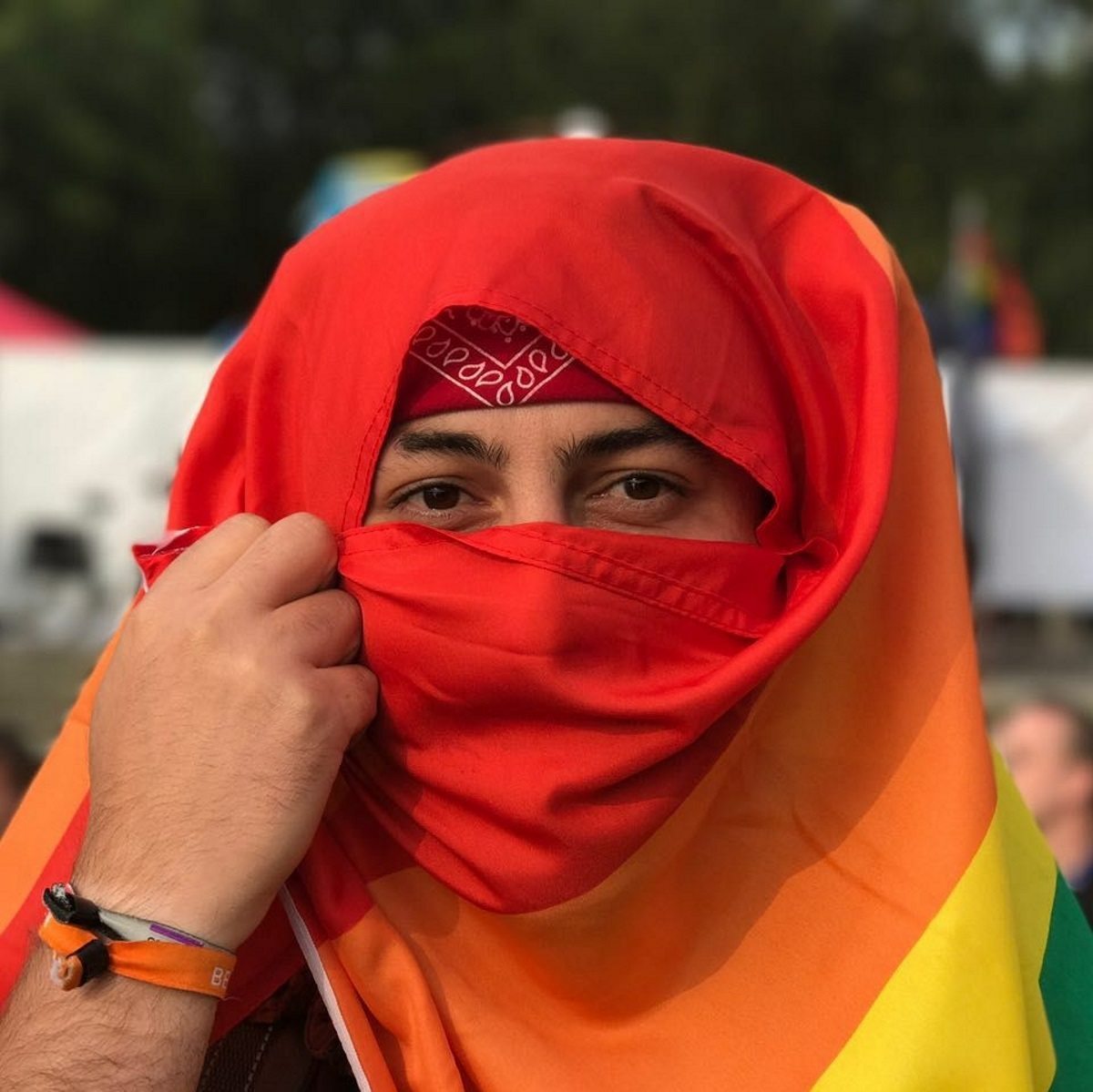
Police conducted a number of raids in the capital of Baku and forced those who they arrested to give up their friends’ addresses, activists have said.
Some of those detained have reportedly had their heads shaved.
Nefes LGBT Azerbaijan Alliance issued a warning about the raids, as the country claimed the move was intended to “protect national moral values.”
Ayaz Efendiyev, deputy chairman of the Justice Party, insisted: “Defending these creatures who are sources of immorality, dangerous diseases, and who have been cursed by God, Western circles are trying to destroy our national traditions under the name of ‘human rights’.”
Turkey
Violence is nothing new for the LGBT community in Turkey – but police responded with shocking levels of violence as activists attempted to hold Pride celebrations over the summer.
In June, police in Istanbul fired tear gas and rubber bullets at LGBT activists who had been gathering in order to hold a Pride march.
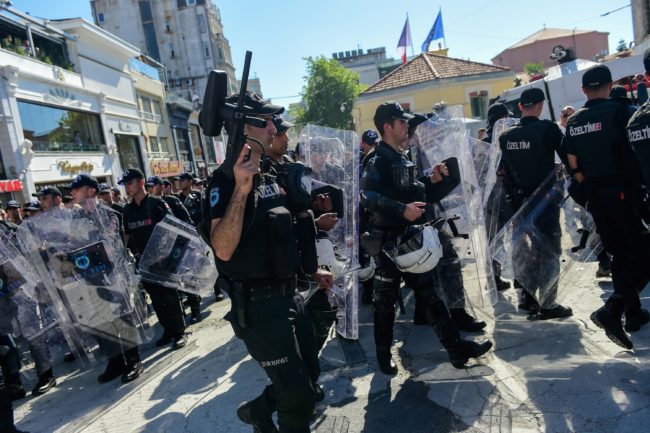
Turkish riot police officers block ways to Istikjlal avenue for LGBT rights activist as they try to gather for a pride parade, which was banned by the governorship, in central Istanbul, on June 25, 2017. (Photo by BULENT KILIC/AFP/Getty Images)
Police violently dispersed the crowd at the event, as over 300 police officers were deployed to the scene in riot gear. A water cannon was also seen at the site of the march.
Authorities across the country also disrupted several other attempts to hold LGBT events.
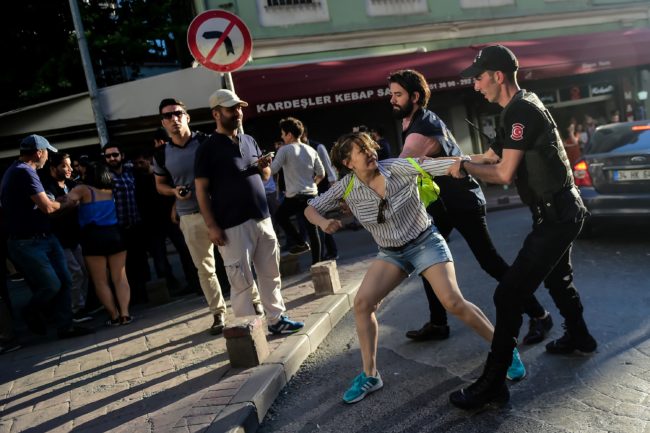
Turkish riot police officers block ways to Istikjlal avenue for LGBT rights activist as they try to gather for a pride parade, which was banned by the governorship, in central Istanbul, on June 25, 2017. (Photo by YASIN AKGUL/AFP/Getty Images)
In Ankara, the capital of Turkey, a gay film festival was banned just days before it was scheduled, with authorities citing concerns of public safety. Officials later pursued a ban against all LGBT events in the city.
“Intelligence reports that terror organizations are seeking to attack dissentient groups or individuals, it is evaluated that this film screening could be provocative and draw reactions,” said the Ankara governor’s office in a statement.
Concerns about the suppression of LGBT events in Turkey have been growing over the past years.
The last successful Pride march was held in Istanbul in 2014, with thousands of people turning out for one of the largest LGBT celebrations in a Muslim majority country.
Every year since, the event has been blocked or disrupted.
Rest of world
Activists in Bangladesh, Uganda, Georgia and Nigeria have also warned about clampdowns.
The UN’s former LGBT human rights expert recently warned of a brewing global crisis for LGBT people amid a “crucible” of rights violations
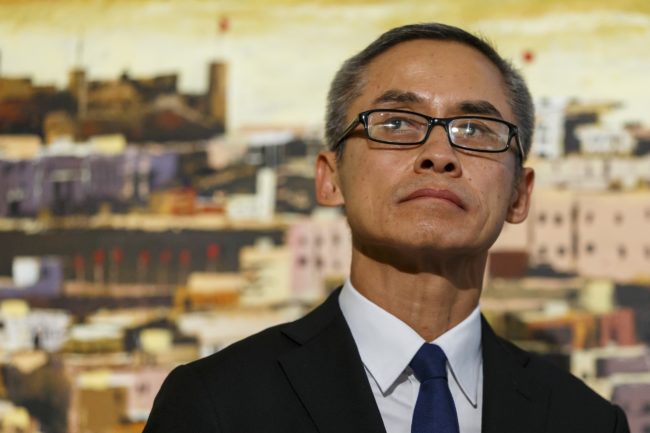
(Photo by FABRICE COFFRINI/AFP/Getty Images)
The UN’s first Independent Expert on protection against violence and discrimination based on sexual orientation and gender identity, Vitit Muntarbhorn, made the warning in a landmark address to the United Nations General Assembly in New York.
The Thai human rights monitor warned that immediate action is needed to stop a global crisis, as LGBT people around the world suffer horrific violations of their human rights.
Mr Muntarbhorn said: “It is unconscionable that people with an actual or perceived sexual orientation, gender identity and gender expression different from a particular social norm, are targeted for violence and discrimination in many parts of the world.
“LGBT people are suffering a crucible of egregious violations, including killings, rape, mutilation, torture, arbitrary detention, abduction, harassment, physical and mental assaults. They are subjected to lashings and forced surgical interventions, bullying from a young age, incitement to hatred and pressures leading to suicide.
“More than 70 countries around the world today still criminalize same-sex relations, and in some of them the death penalty may be applied.
“Even where there is no law criminalizing consensual same-sex relations, laws on public decency, public order and social peace are used in some countries to incriminate people under the umbrella of sexual orientation, gender identity and related gender expression.”
The human rights expert called for all laws criminalizing same-sex relationships to be removed from the statute books, also calling for an end to anti-LGBT ‘gagging’ laws used for the purpose of consolidating power and suppressing dissent.
He also warned that human rights defenders were being increasingly targeted for their work in the field.

(Photo by STRINGER/AFP/Getty Images)
He said: “Non-governmental organizations, human rights defenders and activists, as well as independent national human rights institutions, play a crucial role in the advancement of an inclusive agenda for all without discrimination and distinction, including through the promotion of understanding of and respect for human rights and gender diversity.
“They are agents of change which can activate significant reform processes.”
Mr Muntarbhorn was first appointed to the role last year, as the UN’s first ever independent LGBT rights expert.
He said: “It is anchored in international human rights law, and it is a momentous commitment to multilateralism. It is an invitation to be forward looking and an incentive to move forward together.”
Mr Muntarbhorn said the “universal umbrella of human rights” offered a blueprint for the respect of diversity and appreciation of our common humanity.
However, his report has been met with derision from some countries.

